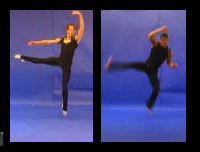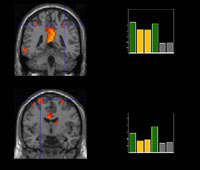


Watch a pair of video clips used in the study. |
Research UpdateDaniel Glaser's Latest Study With Ballet and Capoeira DancersIf you're skilled at a physical activity like ballet, the part of your brain that controls movement activates differently than the same part in the brain of someone who's not skilled in that activity. That's what researchers at the University of College London (UCL) have found in a fascinating new study. The study has implications for helping injured athletes continue to train without moving a muscle, and perhaps even helping stroke victims regain lost movement. In the UCL study, dancers from London's Royal Ballet and experts in capoeira, a Brazilian martial arts form, were asked to watch short videos of either ballet or capoeira dancers performing brief dance moves. While watching the videos, the dancers were lying perfectly still in an MRI scanner. A control group of non-dancers also participated in the study, which was published in the December 2004 online edition of Cerebral Cortex. The researchers found that areas of the brain collectively known as the "mirror neuron system" showed more activity when a dancer saw movements he had been trained perform than when he observed movements he hadn't been trained to perform. (All the dancers in the study were male.) The mirror system in the non-dancers showed appreciably less activity while watching the videos than either of the dancers' mirror systems, and the response it had was the same whether it was watching ballet or capoeira. Earlier studies with monkeys revealed that brain cells called mirror neurons respond both when we do something, like pick up an object, and when we simply watch someone else do it. It was known that these neurons fire when we perform an action, but it came as a surprise that the same cells also fired when we only saw that action being performed. The new study went a step further by showing that such a system operates differently depending on what you are physically expert at doing. "This is the first proof that your personal motor repertoire, the things that you yourself have learned to do, changes the way that your brain responds when you see movement," says Daniel Glaser, a neuroscientist who was part of the UCL team. (Hear Glaser discuss the study's results shown in the graph at left.)
"Our findings suggest that once the brain has learned a skill, it may simulate
the skill without even moving, through simple observation," says UCL's Patrick
Haggard. "An injured dancer might be able to maintain his skill despite being
temporarily unable to move, simply by watching others dance." Similarly, by
understanding how the mirror neuron system works, doctors may be able to better
rehabilitate people whose motor skills were damaged by stroke.—Peter
Tyson
|
Dr. Glaser's collaborators on the dancer study included UCL's Beatriz Calvo-Merino, Julie Grezes, Patrick Haggard, and Dick Passingham. For more about the study, listen to our audio interview with Daniel Glaser in RealAudio or Windows Media, or download it (1.2MB MP3) for later listening. (You can also read a transcript of the interview.) For more on Glaser himself, see his Web site at www.icn.ucl.ac.uk/dglaser/. |
|||||||||
|
|
|||||||||||
|
© | Created January 2005 |
|||||||||||
